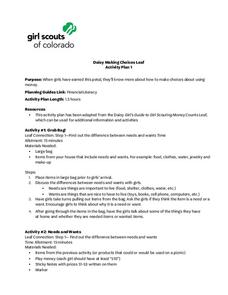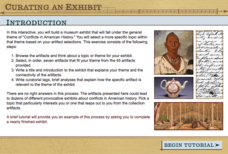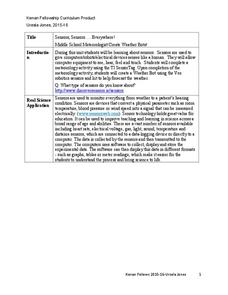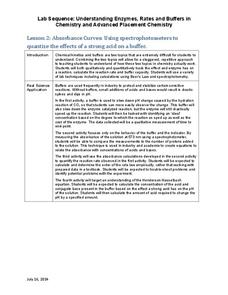Center for History and New Media
The Daily Experience of the Laurel Grove School, 1925
What was daily life like for those attending segregated schools in 1925? Modern learners fill out a KWHL chart as they explore historical background and primary source documents about the Laurel Grove School in Fairfax County, Virginia....
Read Works
Trading Pumpkins
Can you imagine a pumpkin patch without pumpkins? Learners read how Tammy's family solves their problem in a cooperative way, followed by a set of 10 reading comprehension questions.
National Institute of Open Schooling
Water Pollution
Fifteen million children under the age of five die each year due to diseases in their drinking water. Water pollution is the topic of lesson 34 in the series of 36. Scholars, through reading and discussing, study numerous aspects of...
National Institute of Food and Agriculture
Water Pollution Demonstration
Water pollution is everywhere, and pollutants range from oil to fertilizers. Bring the concept to life by demonstrating the difficulties in getting particular pollutants out of water.
Girl Scouts
Daisy Making Choices Leaf
Shed light on the concept of financial literacy with a series of four activities that examines needs vs. wants, gives scholars the opportunity to buy products using paper money, and set goals to save money.
Institute of Electrical and Electronics Engineers
Smart Buildings and the Internet of Things
Is your building a smart building? Pupils learn what makes a building smart and about the internet of things. After viewing several videos on the topic, they conduct an activity collecting data from sensors and brainstorm ways to improve...
Learning to Give
Why Volunteer?
Inspire scholars to volunteer their time to make a positive change in their community. With help from research, a public speaker, and reflection, learners define and asses what it takes to be a volunteer in a business, non-profit,...
CK-12 Foundation
Bowling Alley
Sometimes it appears that a bowling ball slides down the alley rather than rolling, while other times it appears to switch rolling directions at some point. Scholars control the bowling ball size, initial rotation, initial speed, and...
CK-12 Foundation
Ski Jump
What are the three types of energy a ski jumper uses? If you said potential, kinetic, and heat, then you are correct. Scholars adjust the jumper's mass, jumper's form, and height of the start line in the simulation to display graphs of...
CK-12 Foundation
Diamond Cut
How do jewelers tell the difference between diamonds, glass, and cubic zirconia? A sparkling simulation demonstrates how to use a ray of light to determine the substance and ideal shape for a diamond. Scholars control the material,...
Channel Islands Film
Natural Resources, and Human Uses of Plants and Animals
As part of their study of the restoration projects on Santa Cruz Island, class members demonstrate their understanding of the connections among plant life, animals, and the actions of humans by crafting a model that reveals these...
Annenberg Foundation
Curating an Exhibit
A curated exhibit at a museum has a point of view. Artifacts are selected and arranged to cause viewers to contemplate this point of view or theme. An interactive provides class members with an opportunity to create an exhibit, to curate...
New Jersey Historical Commission and New Jersey Council for the Humanities
Thomas Edison: The Wizard of Menlo Park
What would change in your daily life due to a power outage? Here, learners explore the inventions brought to us by the one and only, Thomas Edison, and imagine a day without them. Scholars take part in a grand conversation and write a...
DiscoverE
Paper Recycling
Paper is made from paper, right? Future scientists take bits of paper and produce sheets of recycled paper. The only drawback? It has to dry overnight.
DiscoverE
Wind Farm
A wind turbine is essentially just a giant pinwheel, right? Individuals first create pinwheels from paper, pins, and pencils. In groups, they model a wind farm along a coast and then test out their designs using an electric fan.
Science Matters
That’s An Otter Story
Young scientists discover how sea otters' habitats have changed due to human impact. Through conversation, video observation, and story reading, scholars identify how human interactions change a specific ecosystem in both positive and...
Generation Rx
Medication Safety Patrol: Activity Stations
Four stations challenge scholars to show what they know about the safety of taking and storing medications. Small groups rotate to read and answer questions regarding prescriptions drugs, examine prescription labels, identify appropriate...
Kenan Fellows
Engineering Skills Through Problem Based Learning
Navigate the ups and downs of learning about energy. Future engineers consider how potential and kinetic energy apply to roller coasters. They design a roller coaster of their own and then use computer design software to showcase their...
DiscoverE
Build a Roller Coaster
Let the good times roll as young thrill seekers build a roller coaster on school grounds. Future engineers design and build a roller coaster from flexible tubing. The roller coaster is for a marble, so there will be plenty of room to let...
Kenan Fellows
Electricity: Sources, Usage, Challenges, and the Future
What does the future of energy look like? Junior engineers collaborate to discover a solution to the global energy crisis during a very hands-on instructional activity. The unit focuses on learning through collaboration to develop a deep...
Kenan Fellows
Sensors, Sensors…..Everywhere! Middle School Meteorologist Create Weather Bots!
My forecast is that you'll want to use the resource. Pupils design and create a weather bot as part of a project-based unit. These bots should be able to measure temperature, humidity, barometric pressure, wind speed and direction, and...
Kenan Fellows
Absorbance Curves: Using Spectrophotometers to Quantize the Effects of a Strong Acid on a Buffer
The Henderson-Hasselbalch equation combined logarithmic terms with the application of carbonic acid as a buffer solution. Scholars learn investigate equation and its applications through hands-on experiments. They collect data and...
Miama-Dade County Public Schools
Middle School Mock Trial Competition
Objection! Scholars participate in a mock trial to gain an understanding the ins and outs of court procedures. Using the Jessie Jones v. Palm City court case, they role play each specific part of the trial, learning how courts operate...
Smithsonian Institution
Water/Ways: The Poetry of Science
Water is the source of life. It appears in poetry in both peaceful and torrential descriptions; it appears in earth science in its liquid, gaseous, and solid states. Combine these interpretations of our planet's most precious and...
Other popular searches
- Virtual Field Trips
- Free Virtual Field Trips
- Grocery Store Field Trip
- Math Virtual Field Trips
- Virtual Field Trips History
- Music Virtual Field Trips
- Farm Virtual Field Trips
- Business Virtual Field Trips
- Virtual Field Trips Lessons
- Aquarium Field Trip
- Field Trip to Historic Houses
- Health Virtual Field Trips

























